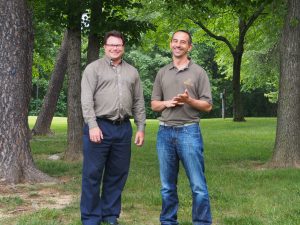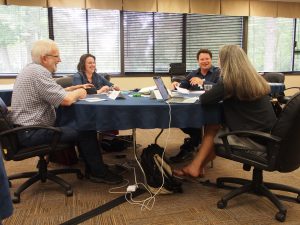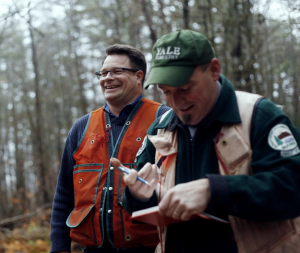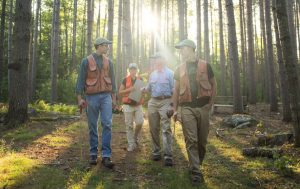 Drs. Aaron Weiskittel and Brian Roth work for the University of Maine, Orono. Aaron is the Director for the Center for Research on Sustainable Forests (CRSF), founded in 2006, and Brian is the Program Leader for the Cooperative Forestry Research Unit (CFRU), a core research program of the CRSF, active since 1975. Both have experience working in forest industry and have a desire to see on-the-ground implementation of research, and are thus keenly suited to conducting stakeholder-driven programs unique to the university.[perfectpullquote align=”full” bordertop=”false” cite=”” link=”” color=”” class=”” size=””]A few years ago, Aaron and Brian found themselves transitioning into leadership roles and being presented the opportunity to make structural changes within their programs. [/perfectpullquote]
Drs. Aaron Weiskittel and Brian Roth work for the University of Maine, Orono. Aaron is the Director for the Center for Research on Sustainable Forests (CRSF), founded in 2006, and Brian is the Program Leader for the Cooperative Forestry Research Unit (CFRU), a core research program of the CRSF, active since 1975. Both have experience working in forest industry and have a desire to see on-the-ground implementation of research, and are thus keenly suited to conducting stakeholder-driven programs unique to the university.[perfectpullquote align=”full” bordertop=”false” cite=”” link=”” color=”” class=”” size=””]A few years ago, Aaron and Brian found themselves transitioning into leadership roles and being presented the opportunity to make structural changes within their programs. [/perfectpullquote]
A few years ago, Aaron and Brian found themselves transitioning into leadership roles and being presented the opportunity to make structural changes within their programs. Not surprisingly, one of the main challenges was lack of financial resources, and how to use those limited funds to maximize value for their stakeholders. In Aaron’s words, “As academics, we aren’t trained to be leaders or organizational strategists. The challenge is to maximize the efficiency of research dollars and do that in a way that appeases the stakeholders. We are aware of the sensitivities and differences between those groups, and we need to find commonalities.” They learned about SBI through a site visit from the Organization of Biological Field Stations, and decided that the course sounded valuable to help navigate their transitioning roles. Aaron noted that in a tight funding environment, “The colleague discount was another incentive to us both coming- that made a difference.”
[perfectpullquote align=”full” bordertop=”false” cite=”” link=”” color=”” class=”” size=””]“The colleague discount was another incentive to us both coming- that made a difference.”[/perfectpullquote]
 SBI helped them develop the tools and methods to think strategically about leadership, as well as provided them the time and space to focus on personal development. SBI is unique in that throughout the course, it gives participants the opportunity to do just that- apply tools and methods to their program. “A key element of the course was going through the materials and devoting a good portion of time to doing self exercises. Knowing we can go through a systematic process to evaluate and think about potential changes is critical” Brian says, noting that the course also highlighted communication with stakeholders about business models and the value of research. Brian has found that increased program capacity is a necessity to stay relevant and create a buffer for external events- and SBI has helped him to attract new members, and strengths, to his research cooperative.
SBI helped them develop the tools and methods to think strategically about leadership, as well as provided them the time and space to focus on personal development. SBI is unique in that throughout the course, it gives participants the opportunity to do just that- apply tools and methods to their program. “A key element of the course was going through the materials and devoting a good portion of time to doing self exercises. Knowing we can go through a systematic process to evaluate and think about potential changes is critical” Brian says, noting that the course also highlighted communication with stakeholders about business models and the value of research. Brian has found that increased program capacity is a necessity to stay relevant and create a buffer for external events- and SBI has helped him to attract new members, and strengths, to his research cooperative.
[perfectpullquote align=”full” bordertop=”false” cite=”” link=”” color=”” class=”” size=””]SBI helped them develop the tools and methods to think strategically about leadership, as well as provided them the time and space to focus on personal development. [/perfectpullquote]

Most recently, Brian revisited the SBI workbook when cooperative members requested a business plan for his proposed idea to build capacity for the program by increasing membership outside of the state of Maine. This presented a challenge- selling that idea to members who liked things the way they were and resisted change for fear of diluting the mission. He used the logic model, did a SWOT analysis, and created a presentation to communicate the strategic decision to concerned stakeholders. “I had to speak their language and be very clear and financially driven. The SWOT analysis took on a whole new meaning when I was actually looking at our strengths and communicating advantages and threats to members both inside and outside of our cooperative.”
[perfectpullquote align=”full” bordertop=”true” cite=”” link=”” color=”” class=”” size=””]”You’ll get more than you expect from it. It’s a unique opportunity to reflect on where your organization is, and where you are within it. It’ll give you the tools to make the right changes, and learn new skills that most of us only get by trial and error.” [/perfectpullquote]
Aaron and Brian particularly enjoyed coming to SBI as a team. Being there together motivated them to work on things not only during course hours, but in the evenings before and after dinner. They also found that having two different perspectives made it easier to communicate the value of the course to their colleagues at the University of Maine. “We were on the same page, exposed to the same methodology, and can now speak the same language” says Aaron.
 To those interested in taking SBI, Aaron says “You’ll get more than you expect from it. It’s a unique opportunity to reflect on where your organization is, and where you are within it. It’ll give you the tools to make the right changes, and learn new skills that most of us only get by trial and error.” Brian adds, “You aren’t alone! We are all facing similar challenges, and at SBI you can work with a bigger group going through those problems and work with a professional staff that are trained in how to get you the tools that you can use.” Both of them highly recommend SBI and have encouraged fellow colleagues at the University of Maine as well as elsewhere to attend, particularly if it can be done as a team.
To those interested in taking SBI, Aaron says “You’ll get more than you expect from it. It’s a unique opportunity to reflect on where your organization is, and where you are within it. It’ll give you the tools to make the right changes, and learn new skills that most of us only get by trial and error.” Brian adds, “You aren’t alone! We are all facing similar challenges, and at SBI you can work with a bigger group going through those problems and work with a professional staff that are trained in how to get you the tools that you can use.” Both of them highly recommend SBI and have encouraged fellow colleagues at the University of Maine as well as elsewhere to attend, particularly if it can be done as a team.


